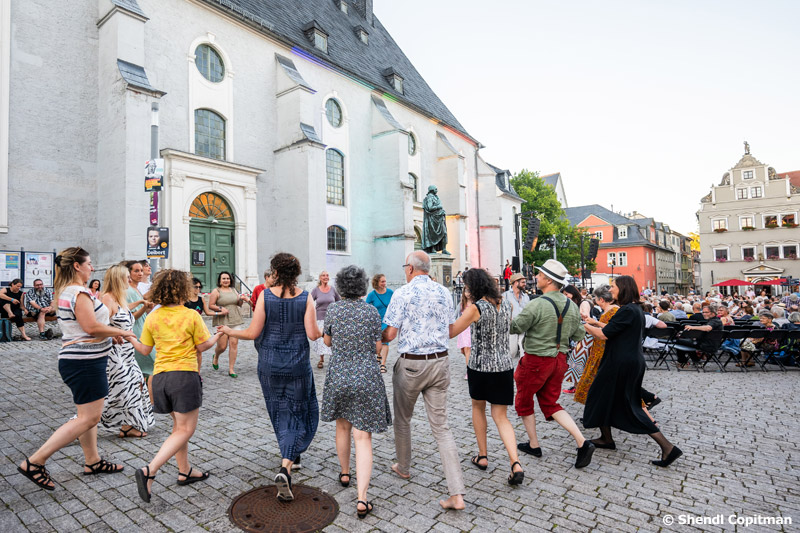Festival Week August 12 – 17, 2025
Welcome to the Festival Week of Yiddish Summer Weimar 2025!
In addition to our world-class evening concerts, film series and late-night cabaret, the Festival Week is packed full of events designed for you to actively participate. You can go as often as you like, and you create your own schedule each day. We don’t charge admission to most of the participatory events, we only ask you for a donation if you’ve enjoyed yourself.
See below for the full listing and descriptions of this year’s Festival Week offerings. We hope to see you at many of them!
We will begin our festival week on Tuesday, August 12, with a film @Lichthaus at 8 p.m. and the first Late Night Cabaret of the week @OMA.
Daily Program
Aug 13-16, 2025 (Wed-Sat) in Weimar
(See here for the Anniversary Day program on Sun, Aug 17, 2025.)

10:00 AM - 03:45 PM @OMA
Mini-Workshops
Free admission (donations gratefully accepted)
Are you curious about klezmer, the Yiddish language or Yiddish song or dance, but a full-on intensive week-long workshop has so far seemed a bit too daunting? Now you have the chance to dip in your toes and try it all out! We're offering a variety of different mini-workshops this year, among them one or two new ones! Come join us for some fun and learning!
(On Sunday, there will also be mini-workshops; however, they will take place in different locations and with a different schedule.)
11:00 AM - 01:00 PM @Stadtschloss/mon ami/Jewish Cemetery
Guided Tours: Jewish Life in Weimar
We are delighted to partner once again with LernOrt Weimar, a group of independent, socially conscious historians that has brought to light fascinating stories of Jewish life in Weimar and Thuringia from the 15th century to today. At a relaxed walking pace, your guide will point out Jewish sites from different historical periods and introduce you to the people who lived and worked there. You will not only learn about restrictions and persecutions against Jewish people, but also about Jewish life, resilience and resistance.
02:00 - 02:45 PM @OMAcafé
Meet the Artists
with Alan Bern & guests
Free admission (donations gratefully accepted)
If you've ever wondered what it's really like to be a professional musician in the Yiddish music world, this is your chance to find out! Each day, YSW Artistic Director, Dr. Alan Bern, interviews the artists who will perform that evening. Since they have all been colleagues for many years, the atmosphere is very relaxed, informal and friendly, and the audience is invited to join the Q&A session, too. A real behind-the-scenes look at how today’s Yiddish music artists think and feel. Daily interview partners will be announced.
04:30 - 06:00 PM @Lichthaus
YSW Films
with Alan Bern & guests
Yiddish Summer Weimar and its community of artists are internationally renowed for projects that are artistically superb, historically revelatory and socially transformative. In keeping with the YSW philosophy, they are voyages of personal, historical and musical discovery that uncover traces of the past in order to create a living, resilient present and future. Each of the five films portrays a project that stands for a major “chapter” in the history of Yiddish Summer Weimar. We invite you to join us for this special retrospective and hope you enjoy the films!
Dr. Alan Bern, Artistic Director of Yiddish Summer Weimar, features in many of the films and will be on hand to introduce each film and lead a discussion with the audience afterwards. Plus – special, surprise guests!
08:00 PM @mon ami | Admission: €20/€10
Evening Concerts
Every day at 8 p.m., we have a different concert or performance for you at mon ami, so make sure you don't miss out! Dance to Yiddish psychedelic rock music, or let the wizards of klezmer from Buenos Aires cast their spell on you, or laugh and cry and be swept away by the flying klezmer circus Der fliendiker balagan...
And, of course, you'll also get to hear our very own award-winning Caravan Orchestra & Choir!
10:00 PM @OMAcafé
Late Night Cabaret
with various artists, first Late Night Cabaret on Tue, Aug 12
Free admission (donations gratefully accepted)
Our late-night cabaret is an open stage for everyone to let their hair down and unwind together at the end of the day. Moderated by YSW Festival Week artists, everyone is welcome to perform, be it a song, a story, a poem, a joke, a pantomime, a magic trick, or anything else that fits the moment. By turns serious and silly, each night is unique. So come to the YSW late-night cabaret, enjoy the fun and show us what you’ve got!
We use only the neccessary cookies. Please see also our data privacy statement.
